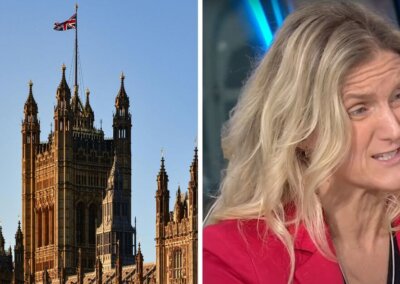A Bill to monitor complication rates for abortion and another to provide support for infants and parents were drawn in a ballot alongside an assisted suicide Bill in the House of Lords this morning.
As part of the beginning of a new parliamentary session, Peers are able to enter a Private Members’ Bill into a ballot in the hope that their bill may be selected and be given sufficient time to become law. In the ballot drawn earlier today Lord Moylan’s Complications from Abortions (Annual Report) Bill was drawn in tenth place and will receive a First Reading on Tuesday 3 September 2024.
Lord Farmer’s Support for Infants and Parents etc (Information) Bill will be introduced to the House of Lords after it was drawn in first place in the House of Lords Private Members’ Bill ballot and will receive a First Reading on Friday 26 July.
While there were no pro-abortion bills in the ballot, Lord Falconer’s pro-assisted suicide Bill, Assisted Dying for Terminally Ill Adults Bill, was drawn in second place and will receive a First Reading on Friday 26 July.
Lord Moylan’s Complications from Abortions (Annual Report) Bill
While the details of this Bill have not yet been released, Government data shows there is an urgent need to review the reporting of complications.
A Government review published in November 2023 revealed that abortion complication rates are likely much higher than has been previously reported in the annual abortion statistics, which are based on reporting from abortion providers.
The review, undertaken by the Office for Health Improvement and Disparities (OHID), analysed Hospital Episode Statistics (HES) for England from the years 2017 to 2021. They compared the complication rate derived from this analysis to the currently reported complications rate derived from the Abortion Notification System (ANS) based on data provided by abortion providers, which are reported in the annual abortion statistics.
The review found the ANS-derived data shows an average complication rate over the 5 years from 2017-2021 of 1.52 per 1,000 abortions whereas their analysis of HES data over the same period showed a complication rate of 4.06, over 2.6 times higher than the ANS data that is reported in the annual abortion statistics.
When their HES data analysis also included incomplete abortions, the complication rate over the same period was 18.16, which is over 11.9 times higher than the ANS-derived complication rate that does not include incomplete abortions.
The difference in reported complications rate was much higher for women under 20 than for the general population. For women under 20, the HES-derived complication rate was 4.43 times higher than the ANS-derived complication rate, compared to 2.67 times higher for the general population. When the HES data analysis also included incomplete abortion, for under 20s the HES-derived complication rate was 17.43 times higher than the ANS-derived complication rate, compared to 11.95 times for the general population.
The review also identified that abortion providers were not recording complications that happened after discharge or after the form that they were recorded on was sent to the Department of Health and Social Care (DHSC). The OHID noted that there was “no evidence” when the review was undertaken in 2022 that abortion providers were informing the (DHSC) to ensure the data was updated when a woman informed the abortion provider about a complication that occurred after the form had been sent.
The review also noted that complications may be less likely to be recorded for terminations where either both or one of the abortion medications is administered at home, because it is unlikely that the person filling in the HSA4 form will know if the woman experienced a complication following an abortion.
Lord Farmer’s Support for Infants and Parents etc (Information) Bill
Similarly, the details of Lord Farmer’s Support for Infants and Parents etc (Information) Bill have not yet been made available. However, examining the Support for Infants and Parents etc (Information) Bill, which was introduced in the last parliament by former MP Sally-Ann Hart and ran out of time before it was able to pass, may give some indication on its content.
Sally Ann-Hart said that she brought forward the Bill to support a baby’s cognitive, emotional and physical development during the 1,001 critical days from pregnancy up to the age of two, by making information on support available easier to access.
The Bill required local authorities to publish a Start for Life offer on their website, which would include information about a number of services that a local authority is aware are available in its area for infants, parents or carers of infants or prospective parents or carers.
The proposed piece of legislation also required the Government to publish an annual report that sets out information about support that is being provided in England for infants and their parents or carers, or prospective parents or carers.
How House of Lords Private Members’ Bills work
At the beginning of each session of Parliament, two days after the State Opening of Parliament, a ballot is held to allocate the order in which the first 25 Private Members’ Bills will be introduced in the House of Lords. Usually, a large number of Peers enter the ballot, providing a short and long title of their bill for the Legislation Office. The order of the ballot determines the order in which the bills receive their First Reading in the House.
Private Members’ Bills in the Lords do not generally get enough time allocated to progress through all stages in the House of Lords, but if they do, they can then be supported by an MP and continue in the Commons.
In the Commons, Lords Private Members’ Bills do not have priority over bills introduced in the Commons, so unless the Government chooses to give them time, they rarely become law.
Peers usually use Private Members’ Bills as an opportunity to raise the profile of an important issue by having it debated in the Lords, and the campaigning and media opportunities that come with that can help them further raise the profile of that issue.
Following the profile-raising of the issue and the momentum for reform that is generated through introducing the bill in the House of Lords, a law change can then be introduced at a later date through another mechanism such as a Private Members’ Bill in the Commons or an amendment to a Government Bill.
Responding to Lord Moylan’s Complications from Abortions (Annual Report) Bill and Lord Farmer’s Support for Infants and Parents etc (Information) Bill being drawn in the ballot, Catherine Robinson, spokesperson for Right To Life UK, said “A Government review published last year revealed that abortion complication rates are likely much higher than has been previously reported in the annual abortion statistics, which are based on reporting from abortion providers”.
“The new Government needs to urgently introduce measures to ensure that abortion complications data is accurately collected and reliably reported on”.
“Lord Moylan’s Complications from Abortions (Annual Report) Bill has been drawn in the House of Lords Private Members Bill ballot”.
“While it is rare for Lords Private Members’ Bills to become law, this Bill will ensure that the issue of complication rate underreporting is put on the radar and debated extensively in Parliament, the media and wider society. This will help raise the profile of this major issue and put pressure on the Government to ensure that abortion complications data is accurately collected and reliably reported on”.
“We also welcome the introduction of Lord Farmer’s Support for Infants and Parents etc (Information) Bill. There are many vital support services available for parents in the community but parents are not always aware of these services. Increasing awareness of these services will ensure that more pregnant women and new mothers have access to them. This will be especially helpful for women facing unplanned pregnancies who would be less likely to proceed with an abortion if they were aware of these support services”.












